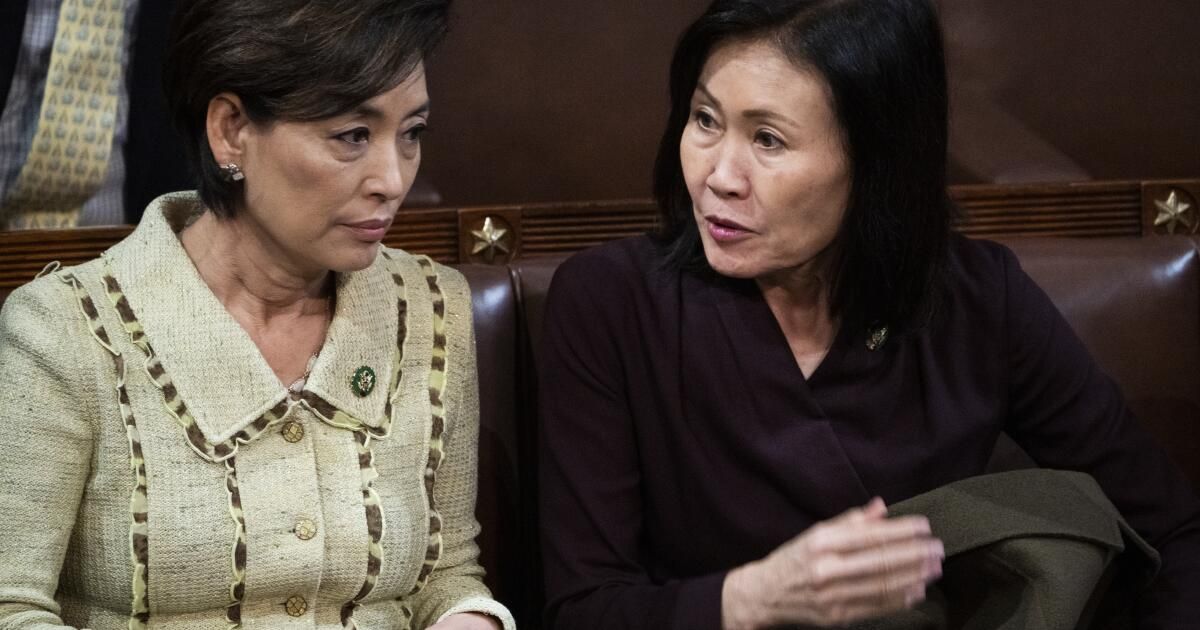Robert Baca’s political compass has always pointed toward the Republican Party, but lately he hasn’t felt at home in the GOP.
Although he voted for Donald Trump in the last two presidential elections, Baca distances himself from the culture wars that seem to inflame today’s die-hard Republicans. Instead, he wants Washington to address the turbulent economy and the rising costs of daily living.
He has been called a RINO (short for “Republican in Name Only”) when he suggested that both parties should work together. He still endorses conservative candidates most of the time, but he is no longer a safe vote for the Republican Party.
“For me it’s not about the game,” said Baca, 46. “It’s about the policy and the person.”
Baca lives in one of four Orange County congressional districts that are expected to be among the most competitive in the country in the 2024 elections, as Republicans and Democrats fight for control of the House.
Baca, a small business owner, is also part of an important emerging group in the Orange County political landscape that UC Irvine researchers in a survey released Wednesday described as “modestly partisan Republicans.” This group differs from traditional Republican voters in a few key areas: They are wealthier, they are diverse, they are more socially liberal, and they are less resistant to paying taxes to help solve problems related to climate change and homelessness. said Jon Gould, dean of the UCI School of Social Ecology, who led the survey.
Once considered the conservative heartland of Southern California, Orange County’s transformation into a more culturally, economically and politically diverse region has forced congressional candidates to find ways to appeal to voters without a strong partisan preference. Voters like Baca will not only be instrumental in deciding who Orange County sends to Washington, but also in determining the balance of power in Congress, Gould said.
“The fight is between independents who could go either way and voters who are not strongly attached to a party and who may simply choose not to vote,” Gould said, adding that Orange County “should be the place where political eyes are glued”. for the future of the next Congress.”
The demographics of Orange County have changed dramatically in the last 20 years. In 2000, just over half of the county’s population was white. Latinos made up approximately 31% and Asians made up 13.5% of the population. Today, the majority of Orange County residents are people of color. About 38% of the population is white, while 34% is Latino and 23% is Asian, according to census data.
Two decades ago, Republicans had an 18 percentage point advantage over Democrats in voter registration in Orange County. Today, Democrats enjoy a slight advantage.
Orange County has been a political battleground since the 2018 election, when Democrats swept all four of the region’s congressional seats.
But it has not been an easy fight for Democrats. Republicans regained two congressional seats in 2020 with the election of Rep. Michelle Steel of Seal Beach and Rep. Young Kim of Anaheim Hills, who became two of the first Korean-American women to serve in Congress. Their victories came even as President Biden led the county by 9 percentage points. The 2022 midterm elections passed without incident: all Orange County incumbents kept their seats.
The nonpartisan Cook Political Report, which has followed House and Senate elections for decades, has listed four Orange County congressional districts, including Steel and Kim’s, as some of the most competitive races in the country.
And the candidates’ performance could depend largely on how they court a growing portion of Orange County voters who are not highly partisan.
The UCI poll, detailed in the report “Red County, Blue County, Orange County,” shows that modestly partisan Republicans in the region have become a “political anomaly.” Unlike members of strongly partisan parties, who are mostly white, most modestly partisan Republicans are Asian and Latino voters, making them demographically similar to Democrats. Almost 50% of them earn more than $100,000 a year.
They also do not share the same cultural agenda as core Republicans. When asked about their opinion of Walt Disney Co., more than 40% of respondents who were moderately tied to the Republican Party had somewhat favorable feelings toward the brand. Among those strongly attached to the Republican Party, less than 20% had somewhat favorable opinions of the entertainment giant.
Disney has been embroiled in a high-profile legal and political battle with Florida Gov. Ron DeSantis, a candidate for the 2024 Republican presidential nomination, that began last year after the company publicly opposed the Bill of Rights. of Parents in Education, which critics often refer to. like the “Don’t Say Gay” bill. The legislation, which DeSantis supported, banned classroom instruction and discussion of sexual orientation and gender identity in some elementary school grades.
The Disney issue, Gould says, offers a window into how modestly attached Republicans view highly controversial cultural issues that GOP politicians like DeSantis have exploited to gain support.
“It strikes me that some of the cultural dog whistles don’t motivate them in the same way,” Gould said.
At the same time, Democrats could use the same cultural issues to “scare some of the independents and modestly connected Republicans into splitting their tickets or perhaps get them to simply not vote in that race,” Gould added.
Although Baca, who lives in Kim’s congressional district, said he’s not sure who he plans to vote for in November, he hopes the candidates will stick to everyday issues rather than fight over issues such as whether transgender people should be allowed to serve. in Congress. the military.
“It doesn’t have to be a fight. We don’t need to attack,” she said. “If we had people in Congress who weren’t so belligerent and not so narrow-minded…we would be much more successful.”
Data outlined in the UCI survey indicated that appealing to Asian and Latino voters, particularly those without a strong partisan preference, could play a crucial role in a candidate’s success in the general election. The survey found that Asian and Latino residents make up the majority of independent voters and those loosely tied to a political party.
For years, Orange County Republicans have focused on recruiting Asian American candidates for local elections and have invested significant resources in attracting Asian American and Pacific Islander voters to win seats. Over the summer, the Republican Party opened a new community center in Little Saigon, home to one of the largest Vietnamese communities outside of Vietnam, to assist in recruiting and training volunteers to reach out to voters.
But they have not had the same success among Latinos. Randall Avila, executive director of the Orange County Republican Party, said this will be the focus heading into November.
“We are going to try to replicate what we have achieved with Asian Americans and extend it to the Latino community,” he said.
California state Sen. Dave Min (D-Irvine), who is running in the hotly contested 47th Congressional District, currently represented by Democratic Rep. Katie Porter, said the Democratic Party “as an institution is behind the eight ball.” by connecting with Asian American Voters.
“I think a lot of times Asian American and Latino groups feel like they’re excluded here,” Min said.












